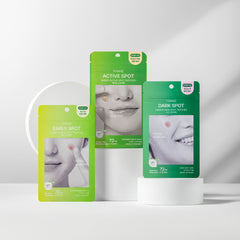The Truth About SPF, Sunscreen and Your Skin

In this article :
Everything you need to know about SPF skincare

Luckily, we’ve learned a lot about the harmful effects of SPF on our skin, everything from causing rapid aging to dry, dehydrated skin, to the worst: skin cancer. While having a “healthy glow” used to mean tanning, it now thankfully refers to hydrated supple skin. All thanks to SPF. But SPF myths are still pervasive today, so we’re here to clear things up about our skin superhero: sunscreen as well as everything you need to know to use it.
What is SPF (sun protection factor)?
Sun Protection Factor or SPF refers to how long your skin is protected against burns or damage from the sun’s UV radiation as compared to the amount of time with no sunscreen. Essentially SPF is your shield, the SPF number determines how long your skin will be safeguarded. Along that logic, SPF 30 takes 30 times longer to burn, SPF 50 even longer. However, do not be fooled just because it says SPF 50 you are not safe all day, apply regularly! Things like sweat and dirt can wipe off your sunscreen!
There are two types of rays UVA and UVB. UVB rays are a major cause of skin cancer. Given the health importance, sunscreens focus on measuring UVB rays. UVA are the aging rays responsible for brown spots, wrinkles and overall appearance of accelerated aging. Many foundations have “broad spectrum” ingredients that focus on UVA protection. The best combo is a day moisturizer with SPF, a light-weight sunscreen then a foundation with SPF. It may seem like a lot of coverage but by 3pm most of your foundation has probably rubbed off!
When do I need to use SPF?
Everyday. Yes, everyday. Yes, even in the winter. Yes, even when it’s cloudy and overcast. Yes, no matter what your skin tone is. SPF isn’t just about preventing sunburns but protecting your skin against harmful UV rays. Even when it's cloudy or overcast, your skin is absorbing up to 80% of the sun's rays. Even if you are headed outside to merely walk your dog, or commute to your job, your skin will thank you for the SPF you use.
Do I need sunscreen when it snows in the winter?
You especially need sunscreen when it snows! The dazzling white of the snow reflects light back towards your skin, exposing you twice as much (the water at the beach has the same effect). Ski or beach vacation alike, do not forget your sunscreen and other forms of sun protection and reapply, reapply, reapply.
I don’t want to miss out on the vitamin D I get from the sun!
We get it! But we highly recommend getting it through a vitamin D rich diet or through supplements, as the damage the sun can do is worse than the benefits you receive from vitamin D.
How much SPF do I actually need?
Most dermatologists will tell you to use a broad spectrum SPF higher than 30 for daily use. Most adults only are getting about 25% - 50% of the sunscreen they actually need, so we recommend using it as a stand alone product and not just in a moisturizer. SPF 30 blocks about 97% of harmful rays but no SPF can block 100%, so be sure to take time under covered areas and protective clothing on particularly sunny days.
Is a higher SPF better?
Yes, but only to a point. Many dermatologists warn against an SPF higher than 50 for two main reasons. Firstly, SPF over 50 is only marginally more effective, so it may not be worth the additional cost. Secondly, a sunscreen higher than SPF 50, may give you a false sense of security, thinking you may not need to apply as often.
Where should I apply sunscreen?
Pay special attention to your face, but you should apply sunscreen anywhere skin is exposed. Be sure to address commonly missed areas: the tops of your feet, your neck, your ears and your hairline / part. Don’t forget your lips! There are many balms that include an SPF 30 that we highly recommend.
What sunscreen should I use for my skin type?
Some general sunscreens may be too heavy for you if you have oily skin, dry skin, or even sensitive skin. Your best option is to have separate sunscreens for your face and body. SPF now comes in creams, powders, sprays, and even foams! You can find ones that are oil-free, mineral sunscreen, or dry without residue, so there are fewer excuses to avoid this necessary product.
How often do I need to reapply sunscreen?
Reapply every few hours, anywhere skin is exposed. Many dermatologists recommend using the amount needed to fill a shot glass to cover your body and then about a dime sized amount to cover your face.

